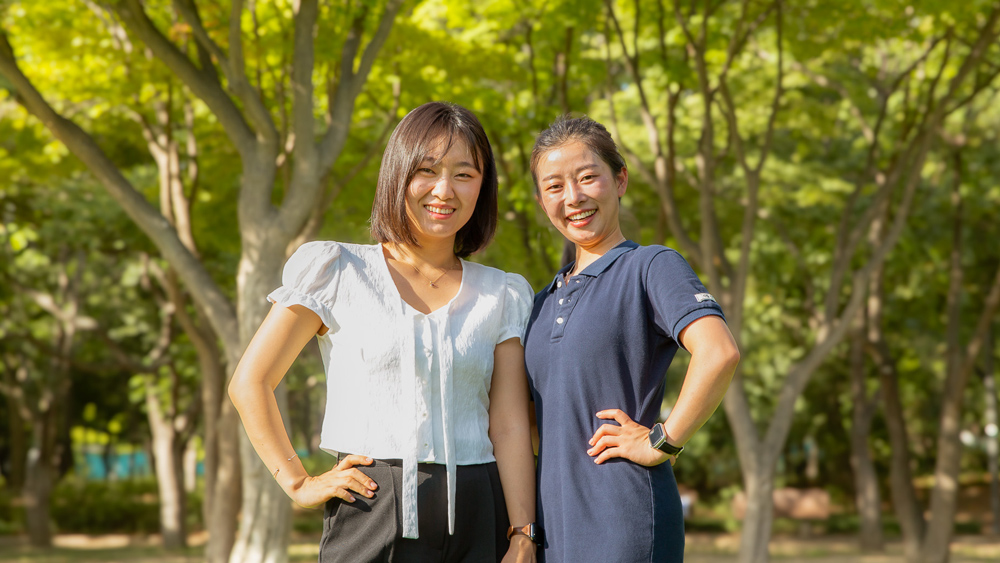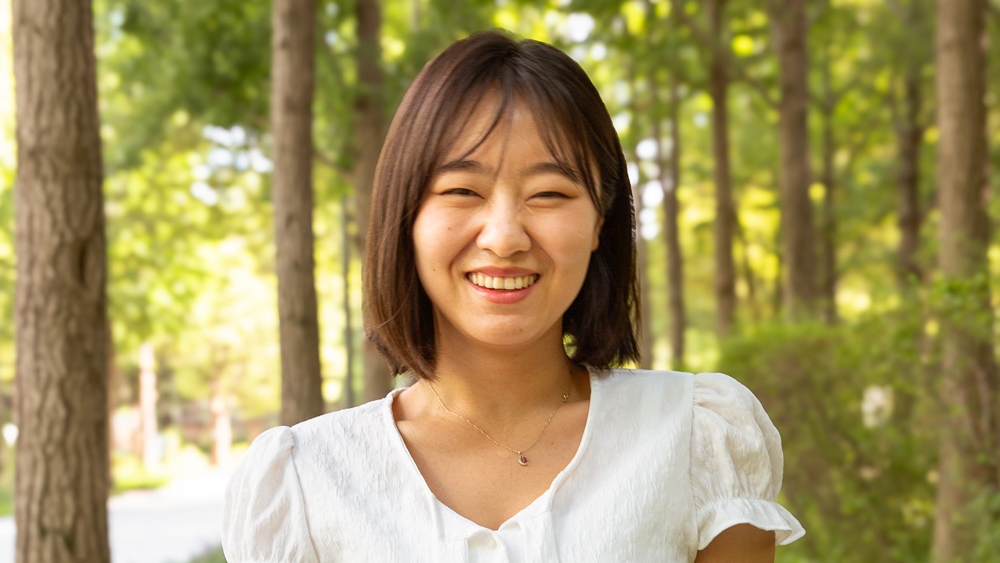A North Korean Refugee’s Journey - Pursuit of the Freedom to Learn
By Yukyung Lim
Yukyung is a participant of LiNK’s Intensive English Program (LIEP), designed to build the capacity of North Korean English speakers at the intermediate level. In partnership with the British Council, LIEP aims to cultivate participants’ communication and critical thinking skills in English. LIEP is complementary to our broader LiNK English Language Program (LELP), which supports speakers of all proficiency levels.

I was born in North Korea—a place where identities are imposed, voices are silenced, and dreams are tightly confined. There, schooling is not a pathway to opportunity but a means of indoctrination, designed to enforce obedience and suppress individuality. But thanks to my mother’s courage, I never had to undergo that system. She made the bold decision to keep me out of school in North Korea. At age eight, I escaped to China to reunite with her, beginning a journey that would define not only my identity but also my deep, lifelong yearning to learn.
In China, my mother obtained a false identity for me so I could enroll in school. That first day in a rural classroom marked the beginning of a different kind of life. I was behind, anxious, and constantly aware of our fragile situation.
For the first time, however, I was learning not to obey—but to think.
A year later, we moved to Beijing. There, I stepped into a world I had never imagined—one of academic rigor, intellectual freedom, and cultural diversity. It was in that environment that I first witnessed how learning can transform a person. Each lesson, each classroom conversation, opened doors not only to knowledge but also to self expression, confidence, and hope.
One winter afternoon in 2010, I was on my way to the bookstore, backpack heavy on my shoulders. Beijing was bleak and cold that year. Snowflakes fell softly, only to be crushed by cars and vanish into the grime of the streets. That scene reflected my life: I bore a name I couldn’t speak aloud, fears I couldn’t share, and a fragile existence that felt quietly lonely.
Inside the bookstore, warmth greeted me. I wandered through the aisles, searching for a quiet corner to rest. Then, I saw it—a book with a black-and-white cover, its portrait etched in solemn ink. The man’s composed expression exuded a power I longed for. I picked it up, almost unconsciously.
“I Have a Dream.”
“I have a dream that one day... people will not be judged by the color of their skin but by the content of their character.”
“This is the time to make real the promises of democracy.”
“We will not be satisfied until justice rolls down like waters and righteousness like a mighty stream.”
These weren’t just words. They were light, seeping through a crack I hadn’t known existed. In a world that had taught me to stay small and silent, they spoke to a part of me I had hidden away. For the first time, I felt truly seen—not for where I was from or what I looked like, but for my thoughts, my voice, and the quiet strength I carried within.
Later, after arriving in South Korea, I faced new challenges. Though I had returned to my cultural roots, I felt out of place. I was older than my classmates, unfamiliar with many social norms, and unsure of how to fit in. But with time, I began to build friendships and navigate this new society. Again, learning was central—it provided not just academic skills but also the social space to grow and belong.
During university, I studied abroad in Texas. It was my first experience in a Western classroom. I was struck by the openness, the individuality, and the value placed on diverse opinions. Being among students from different backgrounds showed me how perspectives can differ—and how that difference enriches everyone.
Wherever I was—in China, Korea, or the United States—the classroom was where I grew the most. It was where I stepped outside my comfort zone, gained confidence, and slowly came to understand who I was becoming.
Across all these countries, I’ve developed not just a global perspective but a deep appreciation for the transformative power of learning. In each setting, the classroom became both a battlefield and a sanctuary. I struggled, but I also discovered. I learned new languages, absorbed new worldviews, and came to realize that I was more than a refugee or survivor. I was a thinker, a student, and a human being with agency.
And then I understood something deeper: My story is rare—but it shouldn’t be. There are still millions of children in North Korea growing up without the right to question, to dream, or to imagine a world beyond their borders. They deserve more than silence or sympathy. They deserve the same chance I had—to envision a different future and be equipped to pursue it.
That’s why I’m sharing my story through Liberty in North Korea. Because stories hold power. They build bridges, shatter stereotypes, and create connections.
North Korean people are not just victims. They are potential scholars, leaders, creators, and changemakers—if only they are given the freedom to grow.
My dream is to one day build a global school for children who, like me, come from hardship but brim with promise. I want to help others discover the same sense of identity and possibility that learning gave me. Until then, I will continue to advocate, teach, and connect.
If you’re reading this, I hope you’ll join me. Learn more. Speak up. Share stories. Support organizations like LiNK that are fighting to empower North Korean people with freedom, dignity, and opportunity.
Because when you invest in a child’s education, you’re not only changing one life—you’re challenging an entire system and planting seeds for a freer world.
Opportunities like LiNK’s Intensive English Program (LIEP) are helping North Koreans succeed in resettlement, reach their goals, and lead change on this issue. Your support can help us continue to make an impact in the lives of North Korean refugees.
Give Today
North Korean Fellows in the United States: Meet the Class of 2025

Please join us in welcoming Hannah and Rose, LiNK’s 2025 Advocacy Fellows!
The Advocacy Fellows program partners with young North Korean defectors to build their skills as effective leaders, storytellers, and agents of change for this issue. Hannah and Rose spent the last month training and preparing with our team in South Korea, and will now be traveling across the US to share their stories!
Join us at a Fellows speaking event near you!
Dallas, TX
September 9th, 6pm
Southern Methodist University | Dallas Hall Room 306 (McCord Auditorium)
3225 University Blvd, Dallas TX 75205
RSVP Here
Guest parking information here
Waco, TX
September 11th, 6pm
Baylor University, Foster Campus | Room 240
1621 S 3rd St, Waco, TX 76706
RSVP Here
Parking: 1521 S Fourth St. Waco,TX 76706 (Google maps or Apple Maps)
Madison, WI
September 16th, 12pm
UW-Madison | Lubar Commons (Room 7200)
975 Bascom Mall, Madison, WI 53706
RSVP here
Evanston, IL
September 20th, 5pm
Northwestern University | Harris Hall 107
1881 Sheridan Rd, Evanston, IL 60201
RSVP Here
Palo Alto, CA
September 28th, 1:20pm
True North Church
655 Arastradero Road, Palo Alto, CA 94306
RSVP Here
Berkeley, CA
September 29th, 6pm
UC Berkeley | Stephens Lounge at the MLK Student Union
2495 Bancroft Way, Berkeley, CA 94720
Parking: Lower Sproul Garage
RSVP Here
Washington, D.C.
October 8th, 1pm ET
The Stimson Center
1211 Connecticut Avenue Northwest Washington, DC 20036
RSVP Here
*Online livestream also available: RSVP Here
Washington, D.C
October 9th, 10:30am
ET Hudson Institute
1201 Pennsylvania Ave N.W. Suite 400 Washington, DC 20004
RSVP Here
Philadelphia, PA
October 13th, 5:30pm
University of Pennsylvania
3401 Walnut Street, Philadelphia, PA 19104
RSVP Here
New York, NY
October 16th, 2025, 12 PM
The Korea Society
350 Madison Avenue, 24th Floor
New York, NY 10017
RSVP here
Los Angeles, CA
October 21st, 7:30pm
UCLA
Haines Hall Room A2 Portola Plaza, Los Angeles, CA 90095
Parking available in UCLA Parking Structure 2
RSVP here
Additional details and timely updates will be sent to RSVP’ed guests via email.

Hannah is a 4th year student at Hongik University studying Electrical and Electronic Engineering. While participating in LiNK’s Changemaker Scholarship Program, she worked on developing devices and strategies that increase information access for people inside North Korea. Her goal as an Advocacy Fellow is to grow as a leader and communicator, and facilitate more collaborative work on this issue.

Rose graduated from Hongik University’s Department of Architecture. For her final project, she designed a memorial to honor North Korean human rights and provide comfort to defectors who had to leave their homeland. She drew inspiration from the Holocaust and 9/11 Memorials in the US, and was deeply moved by how such spaces contribute to healing and progress. As an Advocacy Fellow, Rose hopes to continue finding her identity and increase interest in this issue.




